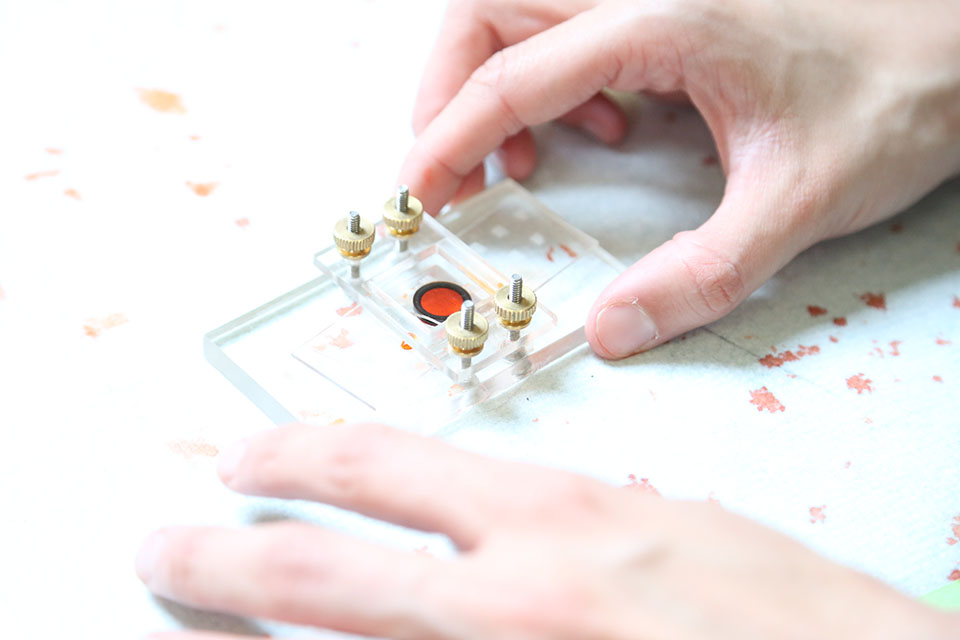Undergraduate Research, Jobs
 The best way to learn physics is by doing it.
The best way to learn physics is by doing it.
Hands-on learning has always been an essential and valued part of the undergraduate experience in the physics department. It begins with the laboratory courses of the first two years (PHYS 19A, PHYS 19B, PHYS 29A). These lead to the advanced physics laboratory, PHYS 39A, in which students carry out in-depth experiments on modern topics such as laser tweezers, holography, X-ray diffraction and chaotic dynamics.
Senior Research Positions
Laboratory courses are only part of the hands-on experiences that are available to our students. Most students carry out independent research (PHYS 99D) during their senior year, which leads to writing an honors thesis and receiving an honors degree. This is usually in the context of the overall research effort of one of the research groups in the physics department and may be a continuation of work that the student has carried out in that group during the previous summer or year.
Expand All
- Direct Fiber Positioner System: A Method to Guide 50,000 Optical Fibers
Kimika Arai (advisers: Craig Blocker, James Bensinger)
- Effect of salt concentration on re-entrant liquid-liquid phase separation of DNA nanostars
Mohammad Nosherwan Malik (advisers: Ben Rogers, Guillaume Duclos)
- Liquid-Liquid Phase Separation of DNA Nanostars in a Colloidal Liquid Crystal
Ernest Park (advisers: Guillaume Duclos, Ben Rogers)
- Resolving Distant Objects via Gravitational Lensing
Alysa Rogers (advisors: John Wardle, Dan Schwartz)
- Understanding Backgrounds: Suppression of Non-prompt Leptons for the ATLAS Petector at the Large Hadron Collide
Iria Wang (advisers: Gabriella Sciolla, Aram Apyan)
- Non-equilibrium Steady States in Driven Phase Separation of DNA Nanostars
Alex Wofford (advisers: Ben Rogers, Guillaume Duclos)
- Reovirus Outercoat Degradation: A Model for Cathepsin Activity in Endosomes
Miranda Gavitt (advisers: Tijana Ivanovic, Avital Rodal)
- Investigation of Leak Detection in the Outer Detector of the LUX Zeplin Dark Matter Experiment
Mark Murdy (advisers: James Bensinger, Bjoern Penning)
- Analysis of Attractor Basins in Finite Size Networks of Randomly Connected Firing-Rate Units
Sam Smith (advisers: Irving Epstein, Paul Miller)
- Properties of Piezoelectric Tube Actuators for use in a Fiber Positioner for a Spectroscopic Telescope
Guadalupe Duran (advisers: James Bensinger, Marcelle Soares-Santos)
- Silicon Photomultipliers: Characterization and Cosmic Ray Detection
Joshua Heller (advisers: James Bensinger, Bjoern Penning)
- New Locking Theorems for Bit Threads in AdS/CFT
Joel Herman (advisers: James Bensinger, Marcelle Soares-Santos)
- Design Principles of Structures Assembling in a Limited Pool
Rabeya Hussaini (advisers: Jané Kondev, Thomas Fai)
- Efficiencies and Limits of Production Modes of R-parity Violating sneutrinos
Evan Solomon (advisers: Craig Blocker, Bjoern Penning)
- Topological Defects as Structural Markers in an Active Nematic
Blake Langeslay (advisers: Seth Fraden, Aparna Baskaran)
- Background Modeling in PYTHIA for Higgsino SUSY Search
Kimberly Rigger (advisers: Craig Blocker, James Bensinger)
- Capillary Valve Based Microfluidics for Protein Crystallization
Yanlin Li (advisers: Seth Fraden, Aparna Baskaran)
- Imaging in Radio Astronomy: A Complete Sample of High Redshift Quasars
Jesse Reeves (advisers: Richard Fell, John Wardle)
- Radio Imaging of a Complete Sample of High Redshift Quasars
David Matthews (advisers: John Wardle, Richard Fell)
-
Phase Dynamics of Coupled Oscillators in Microfluidic Lattices
Remi Boros (advisers: Seth Fraden, Michael Hagan)
-
Antenna Mechanism of Length Control of Biological Filaments
Everett Weber* (advisers: Jané Kondev, Michael Hagan)
-
An Agent-Based Approach to Public Goods Games
Marc Fishbein (advisers: Jané Kondev and Seth Fraden)
-
Fidelity of Transcriptional Logic Gates
Ziwei Huang (advisers: Jané Kondev, Michael Hagan)
-
Elasticity of Rigid Rod-like Biopolymers
Margaret Morris (advisers: Zvonimir Dogic, Richard Fell)
-
Rate Equations for the Shear Jamming Process
Edwin Faican (advisers: Bulbul Chakraborty, Aparna Baskaran)
-
A search for a W' to mu+nu resonance using data from pp collisions at sqrt(s) = 13 TeV with the ATLAS detector
Brendon Bullard (advisers: Gabriella Sciolla, Craig Blocker)
-
Regulation on interacting receptors can stabilize synaptic efficacies
Minyuan Yao (advisers: Michael Hagan, Aparna Baskaran)
-
Polymorphic Transitions of Flagella
Helen Yang* (advisers: Zvonimir Dogic, Aparna Baskaran)
-
Modeling the Jet of the Quasar 3C 273: Adding Faraday Effects
Micah Margolis (advisers: John Wardle, David Roberts)
-
Bioinformatic Approaches to Chromatin Structure and DNA Editing in D. melanogaster
Christa Caggiano* (advisers: Michael Rosbash and Paul Miller)
*Biological Physics
Research positions are usually paid and can be part of a student’s work-study financial aid. Over the course of their undergraduate careers at Brandeis, students are encouraged to obtain experience in two or more research groups. These jobs reinforce material from lecture courses and help students develop a wide range of practical skills. The jobs also provide undergraduates a window into the life of a graduate student who participates in cutting-edge scientific research.
These opportunities fit naturally within the initiative for experiential learning from the Office of the Dean of Arts and Sciences. Students can receive academic credit for one semester of a research job. This appears on the student's transcript as PHYS 93, “Research Internship.”
Students may be invited to participate in symposia organized by that office, bringing together students from many disciplines. Senior physics majors who have carried out independent research for an honors degree must present their results at the annual Physics Department Graduate and Undergraduate Student Research Symposium, named for the late professor Stephan Berko.
Summer Opportunities
Rather than working in one of the research groups in the physics department, it is possible to participate in other programs across the country. Every year, the National Science Foundation funds “Research Experiences for Undergraduates” in a wide variety of subjects and departments. The student receives a stipend and travel expenses.
Other Fellowships and Internships
There are some special
scholarships and research grants available to Brandeis undergraduates.
 The best way to learn physics is by doing it.
The best way to learn physics is by doing it.